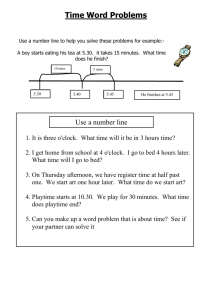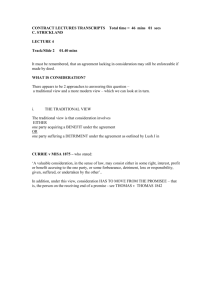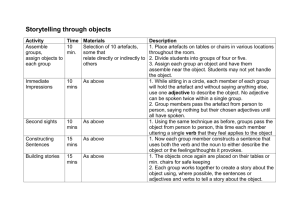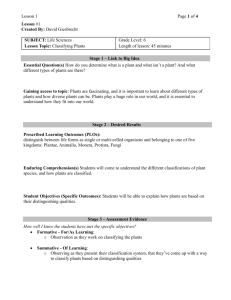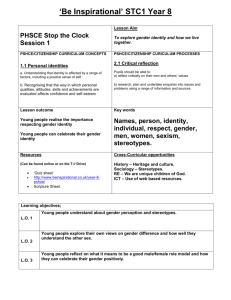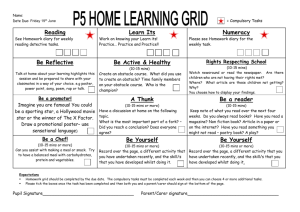LP Erikson + adulthood
advertisement
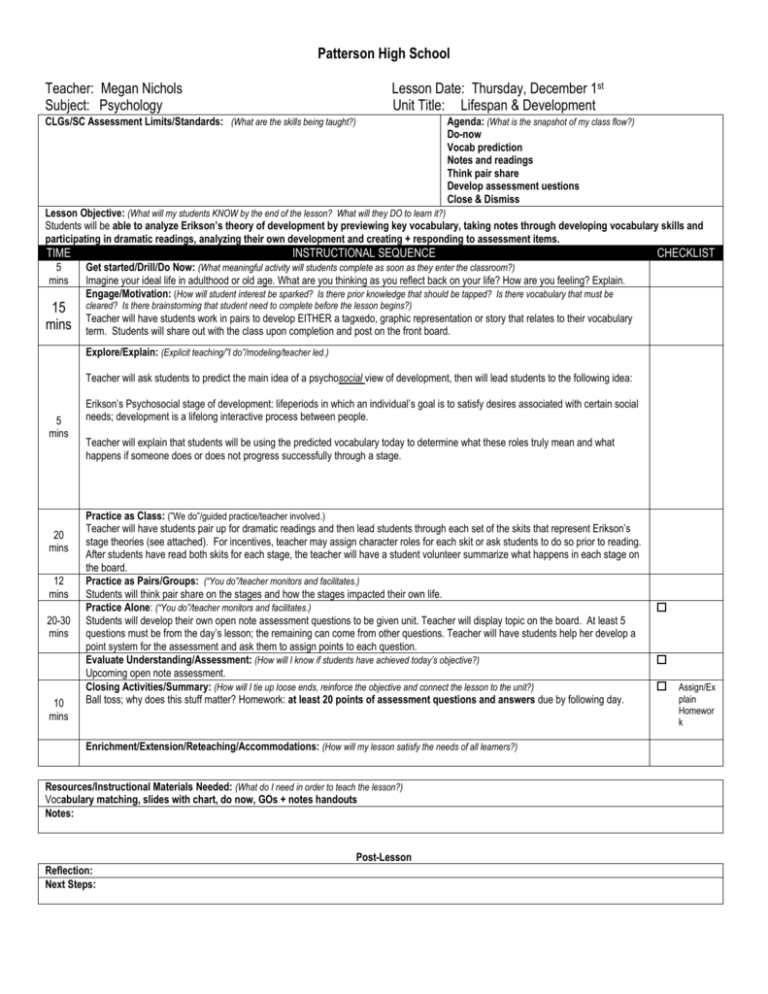
Patterson High School Teacher: Megan Nichols Subject: Psychology Lesson Date: Thursday, December 1st Unit Title: Lifespan & Development CLGs/SC Assessment Limits/Standards: (What are the skills being taught?) Agenda: (What is the snapshot of my class flow?) Do-now Vocab prediction Notes and readings Think pair share Develop assessment uestions Close & Dismiss Lesson Objective: (What will my students KNOW by the end of the lesson? What will they DO to learn it?) Students will be able to analyze Erikson’s theory of development by previewing key vocabulary, taking notes through developing vocabulary skills and participating in dramatic readings, analyzing their own development and creating + responding to assessment items. TIME 5 mins 15 mins INSTRUCTIONAL SEQUENCE CHECKLIST Get started/Drill/Do Now: (What meaningful activity will students complete as soon as they enter the classroom?) Imagine your ideal life in adulthood or old age. What are you thinking as you reflect back on your life? How are you feeling? Explain. Engage/Motivation: (How will student interest be sparked? Is there prior knowledge that should be tapped? Is there vocabulary that must be cleared? Is there brainstorming that student need to complete before the lesson begins?) Teacher will have students work in pairs to develop EITHER a tagxedo, graphic representation or story that relates to their vocabulary term. Students will share out with the class upon completion and post on the front board. Explore/Explain: (Explicit teaching/”I do”/modeling/teacher led.) Teacher will ask students to predict the main idea of a psychosocial view of development, then will lead students to the following idea: 5 mins 20 mins 12 mins 20-30 mins 10 mins Erikson’s Psychosocial stage of development: lifeperiods in which an individual’s goal is to satisfy desires associated with certain social needs; development is a lifelong interactive process between people. Teacher will explain that students will be using the predicted vocabulary today to determine what these roles truly mean and what happens if someone does or does not progress successfully through a stage. Practice as Class: (”We do”/guided practice/teacher involved.) Teacher will have students pair up for dramatic readings and then lead students through each set of the skits that represent Erikson’s stage theories (see attached). For incentives, teacher may assign character roles for each skit or ask students to do so prior to reading. After students have read both skits for each stage, the teacher will have a student volunteer summarize what happens in each stage on the board. Practice as Pairs/Groups: (“You do”/teacher monitors and facilitates.) Students will think pair share on the stages and how the stages impacted their own life. Practice Alone: (“You do”/teacher monitors and facilitates.) Students will develop their own open note assessment questions to be given unit. Teacher will display topic on the board. At least 5 questions must be from the day’s lesson; the remaining can come from other questions. Teacher will have students help her develop a point system for the assessment and ask them to assign points to each question. Evaluate Understanding/Assessment: (How will I know if students have achieved today’s objective?) Upcoming open note assessment. Closing Activities/Summary: (How will I tie up loose ends, reinforce the objective and connect the lesson to the unit?) Ball toss; why does this stuff matter? Homework: at least 20 points of assessment questions and answers due by following day. Enrichment/Extension/Reteaching/Accommodations: (How will my lesson satisfy the needs of all learners?) Resources/Instructional Materials Needed: (What do I need in order to teach the lesson?) Vocabulary matching, slides with chart, do now, GOs + notes handouts Notes: Post-Lesson Reflection: Next Steps: Assign/Ex plain Homewor k Identity Intimacy Integrity Inferiority Autonomy Mistrust
